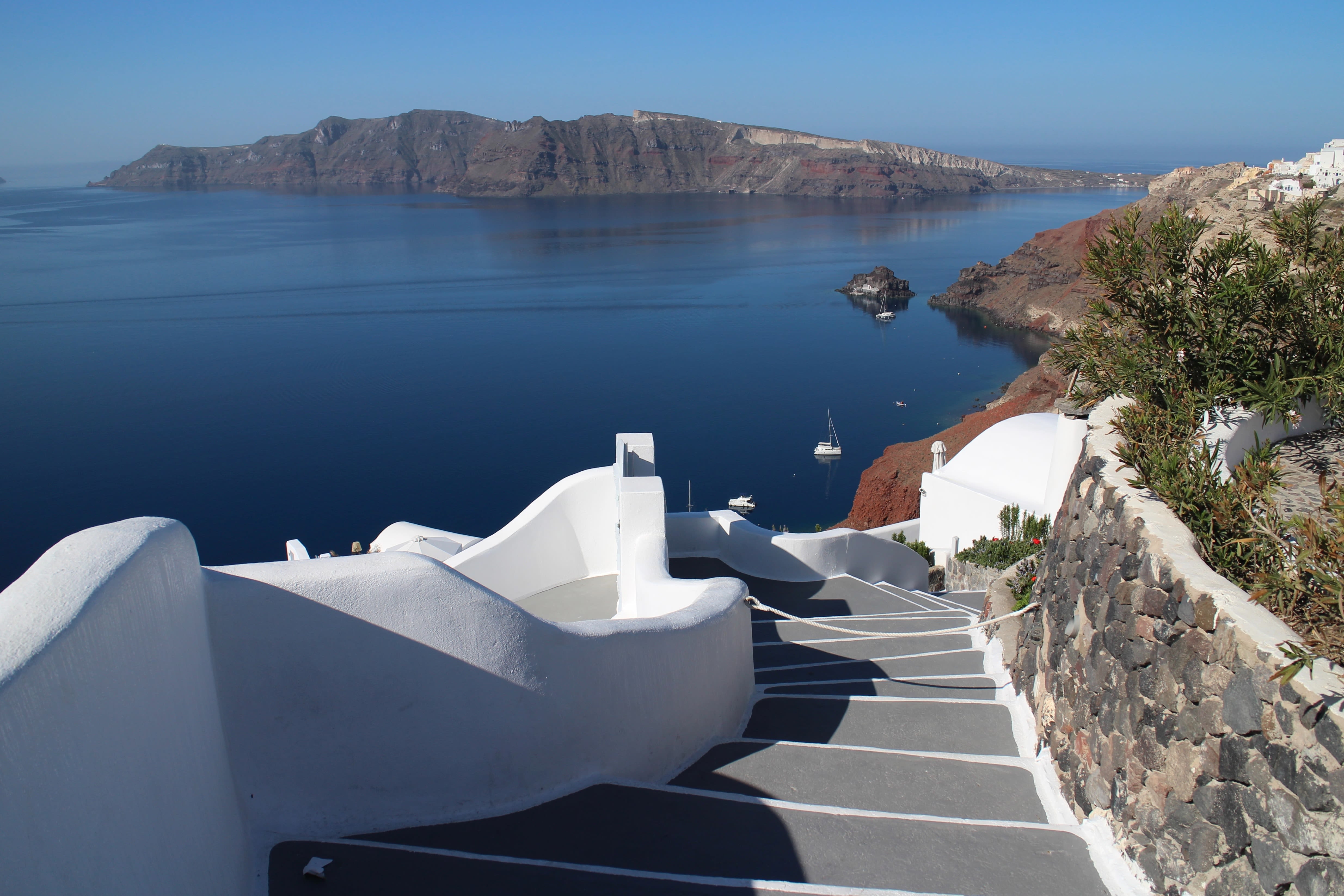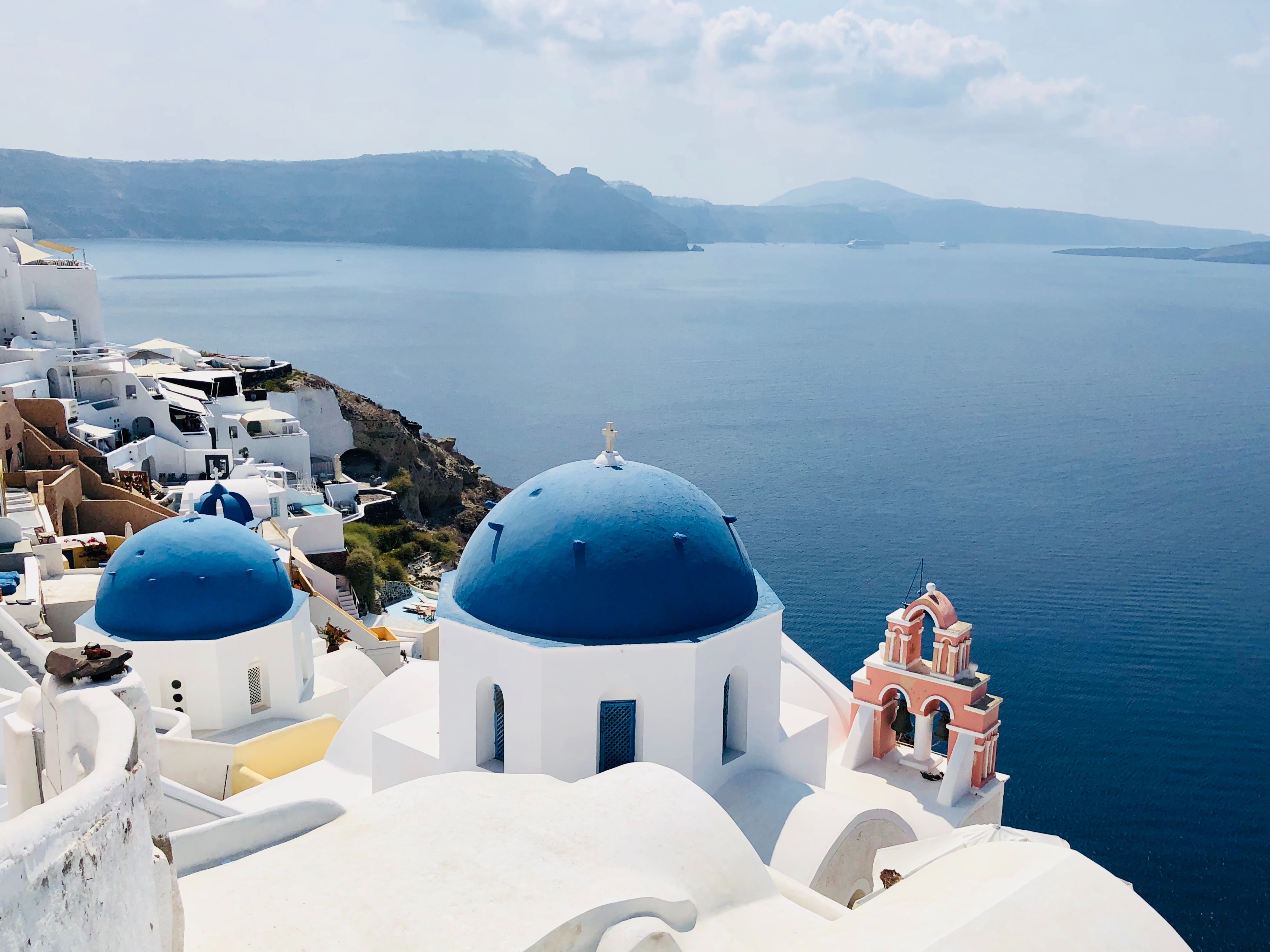If you’re looking for a luxurious and romantic European seaside vacation in one of the most beautiful islands in the world, Santorini, Greece is a great contender. This idyllic Greek island in the South Aegean Sea is world-renowned for its iconic architecture, volcano-powered hot springs, and unbeatable sunset views, drawing millions of visitors every year.
But interestingly, even though it is such an iconic travel destination, the drinking water system leaves something to be desired. So can you drink the water in Santorini straight from the tap? Technically you can, but there are better options for a cleaner and safer drink of water.
Summary: Is tap water in Santorini safe to drink?
- Santorini, Greece is an island that doesn’t have any natural source of water. Instead, the majority of the tap water comes from ocean water that has been run through a desalination plant to make it safe for human consumption.
- Technically, Santorini’s tap water is safe to drink. However, it’s also brackish, and the water supply system itself isn’t always reliable.
- Single-use water bottles are popular in Santorini, but terrible for the environment. To improve the taste and quality of Santorini’s tap water, run it through a filtering water bottle or filtering water pitcher first.

Issues with Santorini tap water
In general, tap water in Greece has ranked fairly highly in quality tests worldwide. However, unlike areas in the mainland like Athens and Thessaloniki that get their drinking water from local surface water sources, islands like Mykonos and Santorini have less reliable water sources. In fact, there are no sources of freshwater in Santorini. Instead, the majority of the island relies on a desalination plant system that takes water from the surrounding oceans and processes it to make it safe for human consumption.
So technically, the water that comes from desalination plants is perfectly safe to drink, since it has to adhere to Greek and European Union water standards before it reaches your tap. However, there are still some glaring issues that make the water quality a little more questionable. In fact, even though the water is technically safe to drink, and can be used to brush your teeth and take showers, some authorities still recommend that you avoid drinking tap water and drink bottled water instead.
Taste
One of the most glaring issues that make Santorini residents and visitors alike prefer bottled water is the taste of the water that comes out of the tap.
Remember, the vast majority of the tap water that comes from the Santorini water supply is ocean water that has been processed to be safe for human consumption. The process of desalination involves separating salt from ocean water. From there, the water is then treated and tested to ensure that it adheres to water quality standards.
But because the drinking water is ocean water that has passed through desalination plants prior to reaching your tap, many people report that the water tastes brackish and salty. In fact, this is probably why so many places in Santorini’s hospitality industry offer water bottles instead.
Issues with water infrastructure
In addition to the obvious taste issue, there are also issues with Santorini’s water infrastructure.
Even though Santorini is making strides by implementing the use of desalination plants, these benefits don’t reach all areas of the island equally. In fact, some sources say that only about half of the villages in Santorini are actually connected to the water system. As a result, many Santorini residents have historically relied on the collection of rainwater to meet their water needs. Unfortunately, this collected rainwater is generally not tested and therefore may not be safe to consume by legal standards.
It’s not just a quality issue either: there’s also an increasing issue with quantity. Because the water supply is largely dependent on desalination plants, issues with energy conservation and blackouts have become major problems in recent years, sometimes resulting in water supply shortages. The issue is also compounded during the tourist season when water demands skyrocket.
Microplastics
In an ocean locale as heavily visited as Santorini, it’s also well worth mentioning issues with microplastics, or tiny pieces of plastics that have made their way into waterways throughout the world. Microplastics are a huge issue worldwide, and plastic fibers are estimated to be in 83% of the world’s tap water.
Unfortunately, the Mediterranean Sea is especially impacted. Reports have estimated that about 229,000 tons of plastic are entering the Mediterranean every single year. What’s worse: the issue is only compounded by the huge numbers of visitors that travel to this beautiful island. It’s estimated that marine litter increases by almost 40% during the summer, when people are most likely to visit. Because the majority of Santorini’s tap water comes from the surrounding ocean, it brings worrying questions as to how much of those plastics eventually end up back in the water supply.
The Takeaway: The best way to drink safe water in Santorini is to filter it first.
Ultimately, the tap water in Santorini is considered safe to drink. However, various issues with the infrastructure, marine litter, and poor taste have led residents and tourists alike to prefer buying water bottles. Unfortunately, the extensive use of single-use plastic can be disastrous, especially since so much of it ends up back in the oceans.
The better solution than buying bottled water the next time you visit Santorini: drink the tap water, but run it through additional filtering first! By running your Santorini tap water through a filtering water bottle like the LARQ Bottle Filtered or a countertop water filter like the LARQ Pitcher PureVis, you can capitalize on the available water supply but eliminate common contaminants like microplastics, particulates, PFAS/PFOA, and heavy metals. A filtering bottle like this one can also come in handy for your future travels, and is a sustainable staple many people prefer.
